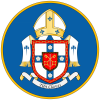Nothing Is Impossible
One of the most prominent features of the liturgical Advent season is the formidable presence of one man in particular, St. John the Baptist. He is the “voice crying in the wilderness”, the man sent by God to “prepare the way of the Lord”. He is the prophet who, according to the Evangelist St. John, “came for a witness, to bear witness of the Light, that all men through him might believe.”
With the end of the Epiphany Octave yesterday, our focus shifts from the Word made Flesh dwelling amongst us, back to our own mundane lives in the midst of a bleak mid-winter. It is a good time to remind ourselves that the darkness of these winter days will eventually come to an end, and correspondingly, that the darkness of these Vatican II Bergoglio days will also end at some point. We await the Second Coming of our Lord Jesus Christ, and although we don’t know the day or the hour when this will take place, let’s face it, it does seem a little closer right now than at any other time in our history.
With this in mind, it is perhaps not too fanciful to consider that God might prepare us for his Second Coming as he did for his First. Throughout the ages, God has raised up men in his Church—learned doctors, for example, who would successfully fight against the errors of their times; or martyrs whose blood would give renewed life to the Church, inspiring ordinary Christians by their courage and example.
For years, we have looked for such a man, one who would know the faith as well as any of the wise Church doctors of the past, while possessing the courage of the ancient martyrs to stand up for that faith in spite of the army of modernist churchmen who oppose everything he, and we, believe. We wondered where such a man would come from: surely not from the dysfunctional pack of traditionalists with their inadequate training and experience, too often accompanied by an unreliable moral character and uncertain validity; nor did it seem likely that the conservative branch of the conciliar Church could ever produce a person sufficiently courageous to condemn Vatican II and its destructive effects.
And then, out of the blue it seemed, there appeared someone who at last gave hope that we might be led out of the dark wokeness of the Bergoglian era, someone who would fearlessly bear witness to the Light, that all men might have one last chance to believe in that Light of Truth. Is this perhaps a turning point in the life of the Church? Let us pray for the good health and continued courage of His Grace, Archbishop Carlo Maria Viganò.
